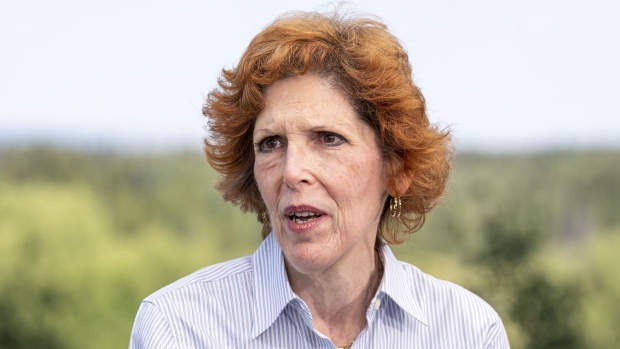Nov 29, 2023
Fed’s Mester Says Policy in ‘Good Place’ to Assess Incoming Data
, Bloomberg News

(Bloomberg) -- Federal Reserve Bank of Cleveland President Loretta Mester signaled she would support continuing to hold interest rates steady at the central bank’s December meeting, saying policy is well placed to assess whether inflation is on a path back to 2%.
“Monetary policy is in a good place for policymakers to assess incoming information on the economy and financial conditions and judge whether policy is well calibrated to ensure that inflation is on a timely path back to 2%,” Mester said Wednesday at an event in Chicago.
She also pointed to cooling price pressures, adding that “there has been discernible progress on inflation even while the overall economy has remained relatively strong.”
While Mester, a vocal supporter of boosting interest rates over the past two years, is not a voter on this year’s policy-setting Federal Open Market Committee, she will vote in 2024. She is due to step down as president of the Cleveland Fed in June, when her tenure ends.
Mester didn’t explicitly say that she’d support a third straight pause in rate increases next month, but her remarks echo those made by other hawkish policymakers this week.
Governor Christopher Waller Tuesday said he’s increasingly confident that the policy rate is well positioned to bring down price growth to the Fed’s goal. Governor Michelle Bowman said she remains willing to support rate hikes if inflation progress stalls, but stopped short of endorsing an increase next month.
Read More: Fed’s Waller, Bowman Open Door to Another Pause in December
Mester held open the possibility that rates could rise in the future, saying that “will depend importantly on whether the economy is evolving as expected, how the risks are changing, and the progress being made on our dual mandate goals of price stability and maximum employment.”
Dual Mandate
Policymakers kept interest rates unchanged for a second consecutive meeting earlier this month, in a range of 5.25%-5.5%, and markets expect they could begin cutting them in the spring.
Mester said earlier this month she hadn’t yet decided whether another rate hike would be needed. On Wednesday, she noted that given various uncertainties in the economy, it could unfold differently from forecasts.
“If it does, monetary policy will need to be nimble and respond appropriately to the evolving outlook and to the risks to achieving both parts of our dual mandate,” Mester said. “I believe the current level of the funds rate positions us well to do that.”
Mester said tighter financial conditions have helped moderate demand, and that improving supply-chain issues have also aided the economy. While activity and the labor market have remained more resilient than expected, she said they’ve also slowed.
Mester also outlined ways to increase resilience in the banking system, repeating that policymakers should consider increasing the countercyclical capital buffer from zero in normal times and arguing that stress tests should also be redesigned to increase their effectiveness.
©2023 Bloomberg L.P.





